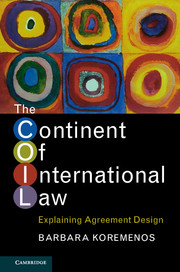Book contents
- Frontmatter
- Dedication
- Contents
- List of figures
- List of tables
- Acknowledgments
- 1 (Re)discovering the continent
- Part I COIL's building blocks: theory and data
- 2 Theoretical framework
- 3 The COIL sample
- Part II Flexibility provisions in the design of international law
- Part III Centralization, scope, and control provisions in the design of international law
- Appendix 1 List of agreements in COIL sample
- Appendix 2 Coding rules
- Appendix 3 Selection issues in international cooperation data sets
- References
- Index
3 - The COIL sample
from Part I - COIL's building blocks: theory and data
Published online by Cambridge University Press: 05 June 2016
- Frontmatter
- Dedication
- Contents
- List of figures
- List of tables
- Acknowledgments
- 1 (Re)discovering the continent
- Part I COIL's building blocks: theory and data
- 2 Theoretical framework
- 3 The COIL sample
- Part II Flexibility provisions in the design of international law
- Part III Centralization, scope, and control provisions in the design of international law
- Appendix 1 List of agreements in COIL sample
- Appendix 2 Coding rules
- Appendix 3 Selection issues in international cooperation data sets
- References
- Index
Summary
This chapter introduces the data dimension of COIL. COIL's empirical focus is on the tens of thousands of extant international agreements (international treaty law) that govern day-to-day international cooperation. Each piece of international law can and should be studied as an institution. Together, this set of institutions, which truly is a “continent,” is theoretically interesting and empirically diversified.
Our intuitions about international cooperation often follow from a few well-studied agreements. Often, the conventional wisdom about international cooperation is shaped and “tested” by these relatively few agreements. The multitude of studies that focus on the WTO as the canonical economics agreement often gives false confirmation that an underlying prisoners’ dilemma-like structure is omnipresent in economic cooperation. Likewise, disproportionate focus on a select few multilateral human rights agreements, like the Convention on the Rights of the Child (CRC), falsely suggests that the prisoners’ dilemma is absent in the whole of the human rights issue area.
In reality, however, international cooperation is far more diverse than these cases would suggest, both across and within issue areas. COIL aims to showcase and harness this diversity. The COIL data set is thus composed of a random sample of international agreements registered with the UN across the broad issue areas of economics, environment, human rights, and security. The data set features bilateral and multilateral agreements, with members representing almost every kind of regime and every part of the world. Some of the COIL agreements are short; some are extremely long. Some call for the creation of multiple intergovernmental bodies, while some create none at all. For each agreement in the sample, hundreds of institutional design variables are coded. Several of these serve as the dependent variables in the analyses in Parts II and III that follow.
In this chapter, I first briefly review the theoretical motivation for the COIL data set and discuss the unique questions it can answer. I highlight some of the main features of the data collection, especially those that might distinguish it from other data sets in existence. I then locate COIL on the spectrum of other international cooperation data sets and discuss complementarities among them. Some of the conventional wisdom is challenged by the first large-n, systematic operationalization of the cooperation problems underlying real international agreements.
- Type
- Chapter
- Information
- The Continent of International LawExplaining Agreement Design, pp. 64 - 98Publisher: Cambridge University PressPrint publication year: 2016



